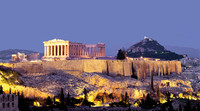By Rose Bennett Gilbert
You are mad to go to Greece now, they all said! Don't you know the economy's tanking? That no credit cards work? The streets are full of riots and demonstrations against the European Union!
But, wait, I said: This is Greece. Eternal Greece. The seat of democracy, the ancient model of the modern Western world. And besides: It's also my friend's 40th birthday party!
So there I was in midsummer, ratcheting across the mountains of the Peloponnese, heading toward the little port village of Paralia Astros, a scant three hours from Athens, where my Danish friend had rented a villa on the beach for a gala celebration with her BFFs from 11 countries on three continents.
The sun was brilliant, the sky bright blue, but the gods were not with me, just another friend, a seasoned travel journalist from London. She played GPS, interpreting the driving directions we'd been emailed — in Danish.
Where was Hermes, the god of travelers and other beseechers? We could have used his help translating the road signs we hurtled past at 120 kilometers an hour in a rented VW that was obviously on its first road trip — the stiff gear shift insisted on slipping from first directly to fourth. Full confession: Years of driving silky automatics had dulled my dexterity, so we did a bump-and-grind through every toll booth.
Driving in Greece is thrilling enough anyway, and not only because it has one of the highest rates of traffic fatalities in the European Union. Once you're out of Athens (don't even think of driving in there), the scenery itself becomes a mega distraction. It's all sky, sea, mountains, olive trees and flowers such as the white oleanders that line the well-groomed highways. You can sense all those earlier EU loans at work on the Greek infrastructure.
You sense something else, too, something ancient and awe-inspiring: that this is where civilization reached its peak — in the fifth century B.C.! And that the art, politics, theater and philosophy of the ancient Greeks is as alive and viable in modern times as it was more than 2,400 years ago.
Yes, there were other ancient civilizations: Egypt, China, Peru. But who puts on their tragedies and comedies today? Whom else do doctors still swear to but Hippocrates? Who gave us Euclidian geometry, Platonic relationships and the Socratic method that's still honing legal minds at Harvard and Stanford universities?
Indeed, the Greeks had a word for everything. Where would we be today without Eros, Narcissis and Nemesis?
Ah, Nemesis! For modern Greeks, the EU has usurped your role. There were mutterings in the marketplace, grim faces in the ATM lines — once the banks reopened after the midsummer shutdown — and fiery demonstrations at Parliament on Syntagma Square the night before we returned to Athens from partying heartily at the seaside.
But, remember, the Greeks also invented stoicism. Everyone we asked about the economic crisis — waiters, cabbies, shopkeepers, hotel owners — answered with a weary shrug. The average Greek has been hurting for a long time. Thousands of the skilled and educated have left their country in search of easier living. The new sanctions' higher taxes and further reduced government spending has spread the blood-and-turnip metaphor to nearly everyone.
"I've lost the second job I used to work to make ends meet," a 20-something sales clerk sighed. A cabbie told us he now drives 24/7, spelling nights with his brother.
But they've known worse. Greece has been through the mill before, many times down through the millennia, as we were reminded by Socrates himself, aka Yale-trained, Emmy-Award-winning Greek actor Yannis Simonides. Founder and director of the 36-year-old Greek Theater of New York, Simonides performs "Socrates Now," an 80-minute solo based on Plato's version of Socrates' speech at his 339 B.C. trial for corrupting the youth of Athens.
You know how it all ends — with that hemlock cocktail — but getting there is an enriching review of Socrates' wit and wisdom, staged in the perfect setting, an open courtyard at the History Museum of Athens University, under-looking the night-lit Acropolis. "Socrates Now" has been a popular road show for the past l1 years, but Simonides brings it home to Athens for three weeks in the summer, in English with Greek subtitles on a video screen (www.polyplanity.com).
This summer it was a really hot ticket: The after-show discussion was "What would Socrates do?" about the current economic crisis. Greeks in the audience offered some warm and fuzzy advice — "We need a sense of community. We must get to know our neighbors"... like that.
My practical London journalist friend signaled for the roving microphone. The solution seemed simple, she said: All Greeks should just pay their taxes. Whereupon Socrates levitated, his toga twirling, and snatched back the mic: "Always telling Greeks what to do!" he snapped. "We've been under the boot for 800 years — the Phoenicians, the Turks, the Germans, the Communists...!" (And the EU?)
We slipped out quietly during the applause and went, giggling, into the rollicking nightlife of the Plaka, the old historic neighborhood that sprawls over the north and eastern slopes of the Acropolis. It's easy to lose yourself in the Plaka's labyrinth of streets and tavernas that spill onto the sidewalks leading up to the illuminated Parthenon, standing golden against the dark night. A magnet for tourists and natives alike, there's merriment in the very air here — also the zest of roasting garlic, lamb kabobs and stuffed things, like zucchini and grape leaves. Add a Greek salad, always fresh and crisp, and wine — retsina if you relish the tang of added resin, a 2,000-year-old Greek specialty.
Culinary cliches? Maybe, but they go perfectly with the twinkling lights under tented roofs and bursts of laughter from tables surrounded by entire Greek families, from Ya-Ya in black to sleeping babies parked on spare chairs.
By day, the south side of the Acropolis beckons. The new (2003) Acropolis Museum offers 4,000 objects in 150,000 square feet, including five of the real Caryatids from the Erechtheum (the sixth is in the British Museum, much to the Greeks' ongoing outrage, along with the choicest sculptures from the Parthenon): www.theacropolismuseum.gr.
Take a break in the museum's pleasant restaurant on the third floor, which has a great view of the Parthenon itself — and its own flock of pigeons.
Seeing the museum first lets you understand the wonders of the Parthenon — in air-conditioned comfort. We were cautioned to time our climb up the Acropolis for early morning or early evening (it's open 8 a.m. to 8 p.m. in summer, Fridays 8 a.m. to 10 p.m.).
Just when we'd had our fill of ancient ruins. we happened on another little-known museum on the south side of the Acropolis: a real jewel, pun intended. The Ilias Lalaounis Jewelry Museum overflows with exquisite creations by this famous Athens craftsman who died in 2013 at age 93. Never heard of him? Neither had we, but boy, was he celebrated by patrons such as Liz Taylor and Aristotle Onassis, who commissioned spectacular earrings for Jackie: www.lalaounis-jewelrymuseum.gr.
Nose pressed against the glass cases gleaming with Lalaounis' masterpieces — he worked mostly in 22-karat gold — it was easy to believe that any minute Jason would arrive with that Golden Fleece to save his poor, impoverished homeland.
WHEN YOU GO
There are zillions of hotels in Athens, many with views of the Acropolis, including the five-star Hotel Grand Bretagne on Syntagma Square (from $340). We stayed in the small, comfortable three-star Hotel Achilleas, 21 Lekka St., close to Syntagma Square (from $125). It is one of three Athens hotels run by Cornell University grad Sofia Kalfopoulou's family, TourHotel Group: the new Acropolis Hill Hotel with a pool ($130) and the Arion Hotel, built in 2004 for the Olympics ($135): www.tourhotel.gr.
Everybody's favorite restaurant in Athens seems to be Tzitzikais kai Mermigas (translation: the Ant and the Cricket), 12 Mitropoleas St., which offers traditional Greek fare in a lively setting. For fast food, Greek-style: Meatropoleos 3, a smart, popular grill with sidewalk service at 3 Mitropoleos St., just off Syntagma Square.
On the Plaka: Almost any taverna.
Our Danish friend booked our holiday house through Novasol, an international agency: www.novasol.com. See the smashing double villa she rented (for $2,300 week peak, $1,100 off-season) at ww.novasol.com/p/GPE322.


Rose Bennett Gilbert is a freelance writer. To read features by other Creators Syndicate writers and cartoonists, visit the Creators Syndicate website at www.creators.com.






View Comments